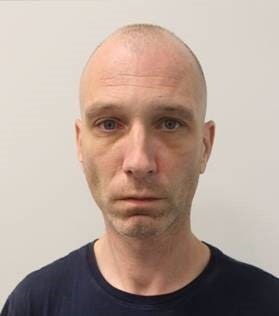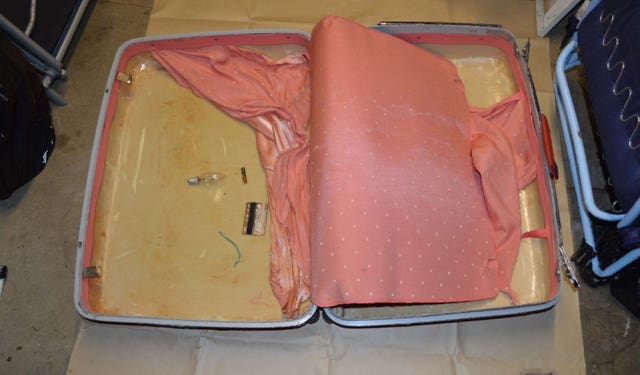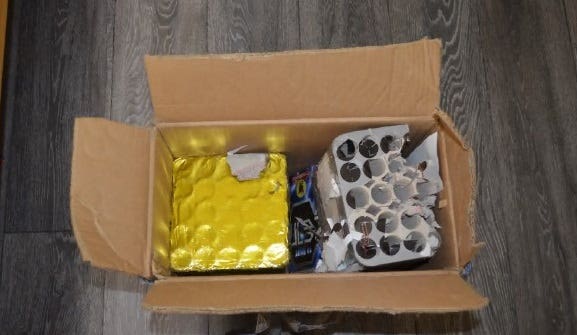
A man who plotted to bomb a south London mosque after becoming fixated on the youngest victim of the Manchester Arena attack has been jailed for four years.
Steven Bishop, 41, of Thornton Heath, south London, stockpiled fireworks and researched instructions on how to build explosives.
His room in sheltered accommodation was raided by counter-terror police on October 29 last year after he showed his key worker images of objects he said he was collecting to make a bomb.
Bishop looked up the Manchester, London Bridge and Paris terror attacks using a phone he bought on October 18.
He repeatedly searched for memorials to the youngest victim of the Manchester Arena attack – eight-year-old Saffie-Rose Roussos.

On October 23 last year he made a £40 donation to the Manchester Emergency Fund set up on the website Just Giving with the comment: “So sad that this happened to little kids.”
A second donation for the same amount made the same day was accompanied by the comment: “I’m in love with my buitiful [sic] Saffie god bless you xx.”
Bishop also searched the “Find a Grave” website looking for Saffie-Rose’s resting place.
He commented “god bless little Saffie” on a Facebook video called “Standing for Britain” which featured some of the victims of the Manchester attack, adding: “Don’t worry something bad is going to happen soon mark my words.”
He had researched explosive detonators, made a set of handwritten notes and searched online for the Morden mosque, detectives discovered.
Bishop denied preparation of an act of terrorism but admitted an alternative charge of possession of an explosive substance with intent to endanger life or cause damage to property on the first day of his trial at Kingston Crown Court.
He previously admitted a charge of possession of information likely to be useful to a person preparing an act of terrorism.
Jailing him for four years on Wednesday, Judge Peter Lodder QC said: “The detonation of one or more of these fireworks at Morden mosque may have risked the lives of those nearby.”

He added: “The incendiary effect of one or more of these fireworks could have caused significant damage to the building and nearby infrastructure.”
“It is submitted that you are so far out of your depth that it is absurd and that the mosque was never truly in danger.
“In that context you are contrasted with a determined and dedicated terrorist. But terrorist acts are not limited to those who do not have similar vulnerabilities to you.
“I am satisfied that count one is properly deceived as connected to terrorism.”
He added: “The seriousness of the offending is reduced by your medical history, but I do not find that your condition at the time of offending was substantially reduced by mental disorder or learning disability.”
Bishop was handed four years for possession of explosives, two years concurrent for possession of terrorist documents, plus one day concurrent for breach of a conditional discharge.
The court heard that when detectives searched his room in sheltered accommodation they found some fireworks that had been tampered with, along with fuses, a remote control and igniter.
Although available to the public, the fireworks were classed as “commercial” because they were of a size used in professional pyrotechnic displays.

A firing device was also delivered to his address two days after his arrest.
Following the search he told officers he was “really upset” about the Manchester attack, adding: “All I was saying is I think it would be justice if someone did to them what they do to us.”
As he was driven to the police station, he repeatedly asked officers about the Manchester attack.
He told them: “I’ll tell the police everything. I hear voices. I heard the voice of a victim of the Manchester Arena bombing who told me to do this.”
Bishop added that he had been hearing the voice of a “young girl” and also asked them if people were still hanged for terrorism.
A search of his phone uncovered two VPN apps, designed to disguise online activity, which were used to research explosive detonators and the Morden mosque.
Further searches at his mother’s house revealed components for making incendiary devices hidden in a suitcase in the garden shed.
Bishop’s notes contained detailed information on how to make various explosive substances, as well as information on how to access the dark web.
He was charged a week after his arrest on November 5 2018.
Prosecutor Dan Pawson-Pounds said: “Much as he never formed the final intent actually to carry out the act against the mosque at any particular point, he accepts that he carried out acts preparatory to it, and in contemplation of it.”
The court heard that Bishop’s psychiatric disorders include paranoid schizophrenia, ADHD, autism spectrum disorder, a possible learning difficulty and drug abuse.
He has 18 previous convictions including for racially aggravated common assault.
Timothy Forte, for Bishop, argued that his client’s actions were driven by his fixation on Saffie-Rose and not by far-right ideology.
“It is only ever about Saffie. There is no expression of anti-Islamic feeling,” he said.
He added: “He’s not seeking to obtain a white Britain or a Muslim-free country. He was seeking in his non-functioning manner to exact revenge for the death of an eight-year-old girl and the Crown can’t demonstrate an ideological cause.”
Mr Forte described Bishop’s plan to target Morden Mosque as an act of “transferred malice” by an “unstable drug addict”.
The court heard Bishop’s benefits had recently been increased to £1,500 but he had otherwise been left largely to his own devices, leading to an increase in his drug abuse.


Comments: Our rules
We want our comments to be a lively and valuable part of our community - a place where readers can debate and engage with the most important local issues. The ability to comment on our stories is a privilege, not a right, however, and that privilege may be withdrawn if it is abused or misused.
Please report any comments that break our rules.
Read the rules hereComments are closed on this article